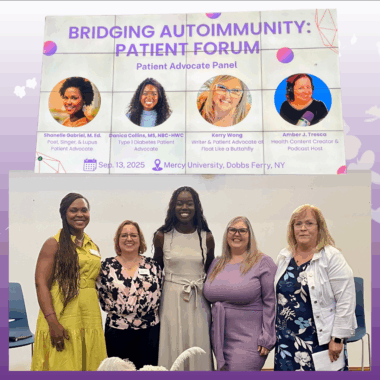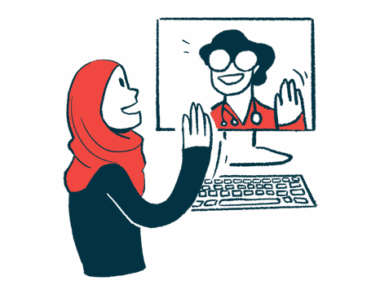It’s empowering to attend a patient forum where people ‘get it’
Magic happens when patients, nonprofits, and providers are on the same page
Written by |

I have a confession to make: I don’t read all my email. I try to, but it can be overwhelming.
Instead, I skim through my inbox to see if I need to read anything right away, then bookmark things I’ll get back to later. Sometimes I’m too delete-happy with the rest, so I almost missed an important message. I clicked “undo” to have another look.
It was from the Arthritis Foundation, alerting me to an upcoming event described as “not just a conference” but also a “community where patients can come together to share insights, support one another, and learn from leading healthcare experts.” Bridging Autoimmunity: Patient Forum was coming soon to a venue near me, with a virtual option for those who couldn’t attend.
That certainly piqued my interest, so I reached out to my foundation staff partner to find out more. She encouraged me to attend and suggested I be a panelist. While, for the most part, sarcoidosis isn’t considered an autoimmune disease, its inflammation stems from an overactive immune response, so it still fits the bill.
A few emails and a Zoom call later, and I was added to the Patient Advocate Panel. I couldn’t wait.
When patients really are the focus
My group included a poet and singer with lupus, a podcast host with inflammatory bowel disease, a health coach with type 1 diabetes, and me, a writer with sarcoidosis. We’ve each found unique ways to share our experience to educate and empower others in our disease communities. Among the many highlights, we all enjoyed an enlightening Q&A session.
IMIDeology, a clinic dedicated to immune-mediated inflammatory diseases that hosted the forum, announced its newest resource for patients, a handbook titled “Living with Fire: A Patient’s Guide to Thriving with Autoimmune and Inflammatory Diseases.” With chapters written by patients, healthcare providers, researchers, and more, this book promises practical advice to help us manage the challenges that autoimmunity brings.
The forum also featured two panels of medical experts. These included the conventional doctors you’d expect, along with practitioners in the fields of physical therapy, nutrition, and psychology. Many of them, including even the rheumatologist and gastroenterologist, focused on holistic care — a refreshing change from the patchwork treatment we often see with a multisystem condition like sarcoidosis.
I was impressed by how patient-focused the event was, thanks to IMIDeology. Nearly every panelist, including nonprofit partners and healthcare providers, had been touched by immune-mediated inflammatory diseases, either as a patient or a caregiver. So they don’t just work in the field, they also “get it” — and that makes all the difference.

From left, patient advocate panelists Shanelle Gabriel, Amber J. Tresca, Danica Collins, Kerry Wong, and moderator Jean Walsh pause for a photo at IMIDeology’s Bridging Autoimmunity: Patient Forum in Dobbs Ferry, New York, on Sept. 13. (Courtesy of Jin Lee)
That’s not surprising for those on the nonprofit side of things. I’ve spent a lifetime volunteering and working with organizations like those at the forum, and there is always significant overlap. Our illnesses steer us toward the information and services they provide, and drive us to fill any void that remains.
We frequently see this with celebrities, such as Michael J. Fox, who created the foundation that bears his name after he was diagnosed with Parkinson’s disease in 1991. The Boomer Esiason Foundation has been supporting the cystic fibrosis community since the pro quarterback’s son, Gunnar, was diagnosed with that disease, also in the early 1990s.
This trend doesn’t seem to be as common with the physicians who treat us, though. I occasionally ask my healthcare providers what made them choose their respective fields. I want to know them as people, too, just as I need them to see more than my medical chart.
Whenever I need a new specialist, I do a little research first. I seek out recommendations from other patients and trusted providers, and look up prospective doctors online. I want to see how they present themselves (and their medical groups) to the public, check their areas of interest, and if possible, read reviews from other patients.
Years ago, when I finally agreed to see a therapist, I started my search in the same manner. Before finding any professional sites, though, I saw a fundraising page for the New York City Marathon. The psychologist it mentioned, who is also a runner, described how her mother’s illness affected her and her family, which led her to support the cause. Her compassion was evident, so I believed she would understand my struggles and help me work through them. I was right.
Those of us in the chronic illness community often talk about the significance of connecting with other patients in the sarcoidosis and broader rare disease communities. These bridges can lead to relationships that last a lifetime. When that type of understanding and support comes from our medical providers and organizational staff, it can truly be life-changing.
Note: Sarcoidosis News is strictly a news and information website about the disease. It does not provide medical advice, diagnosis, or treatment. This content is not intended to be a substitute for professional medical advice, diagnosis, or treatment. Always seek the advice of your physician or other qualified health provider with any questions you may have regarding a medical condition. Never disregard professional medical advice or delay in seeking it because of something you have read on this website. The opinions expressed in this column are not those of Sarcoidosis News or its parent company, Bionews, and are intended to spark discussion about issues pertaining to sarcoidosis.






Leave a comment
Fill in the required fields to post. Your email address will not be published.